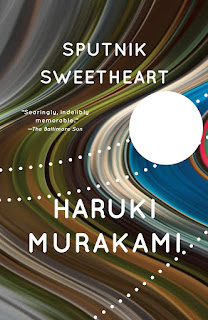"Sputnik Sweetheart" - First Impressions
The book presents a conflict of sorts between its characters' Japanese identities and the influence of American pop culture. For instance, the novel makes a point of accrediting Sumire's existence as an aspiring writer faced with seemingly inescapable writer's block to the great support of her family, the stipend of whom supports Sumire's fruitless career. This level of familial support and the overarching sense of communal responsibility that it betrays is portrayed as falling in somewhat direct contrast to the distinctively American spirit of individualism and self-sufficiency.
Another intriguing element of the novel thus far is the role of language. Since the book was first written and published in Japanese and only translated to English at a later date, there are several instances in which I feel that some of the original meaning was, to a degree, lost in translation. For example, early in the novel, Sumire and K discuss whether there is a difference between the concept of a "sign" and that of a "symbol." While the discussion is still engaging to an English-speaking audience, I still wonder whether the conversation would have been more thematically relevant had we been able to read it in the original Japanese.




Comments
Post a Comment